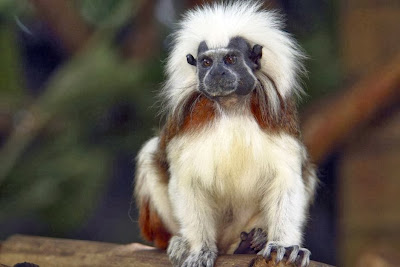 The Cottontop Tamarin is a little types of monkey discovered in the timberlands of South America. The Cottontop tamarin was named due to its tasteful white hide that streams over its head and shoulders.the cottontop tamarin is discovered in tropical backwoods edges and auxiliary timberlands from Costa Rica to north western Columbia where the cottontop tamarin uses the greater part of its existence in the trees.the cottontop tamarin is an omnivorous creature implying that the cottontop tamarin chases both plants and different creatures so as to survive. Foods grown from the ground, creepy crawlies and green plants make up the greater part of the cottontop tamarin's eating regimen as well as little rodents and reptiles, eggs and tree sap.
The Cottontop Tamarin is a little types of monkey discovered in the timberlands of South America. The Cottontop tamarin was named due to its tasteful white hide that streams over its head and shoulders.the cottontop tamarin is discovered in tropical backwoods edges and auxiliary timberlands from Costa Rica to north western Columbia where the cottontop tamarin uses the greater part of its existence in the trees.the cottontop tamarin is an omnivorous creature implying that the cottontop tamarin chases both plants and different creatures so as to survive. Foods grown from the ground, creepy crawlies and green plants make up the greater part of the cottontop tamarin's eating regimen as well as little rodents and reptiles, eggs and tree sap.
Cottontop Tamarin is discovered in tropical timberland edges and auxiliary woods from Costa Rica to north western Columbia where the cottontop tamarin uses the lion's share of its existence in the trees.
Cottontop Tamarins are animated throughout the day and rest around evening time, much the same as individuals. Around evening time they rest crouched together with the most youthful parts tucked amidst the gathering. Throughout the day cotton-top tamarins invest the greater part of their chance scanning for nourishment.
Cottontop Tamarins consume for the most part products of the soil. Frequently they will consume feathered creature eggs and reptiles. They want to lick the sap from trees. Cotton-tops get the water they require from the tree grown foods they consume or by licking the morning dew from clears out.
The eating methodology of the cotton top tamarin is differed however the dominant part of their eating methodology is made up of creepy crawlies. Foods grown from the ground is the second most regular sustenance for this species to consume. Together leafy foods make up very nearly 80 percent of the cotton top tamarin's eating regimen. It additionally consumes gum from trees and other sustenance.
Cottontop Tamarin
Cottontop Tamarin
Cottontop Tamarin
Cottontop Tamarin









No comments:
Post a Comment